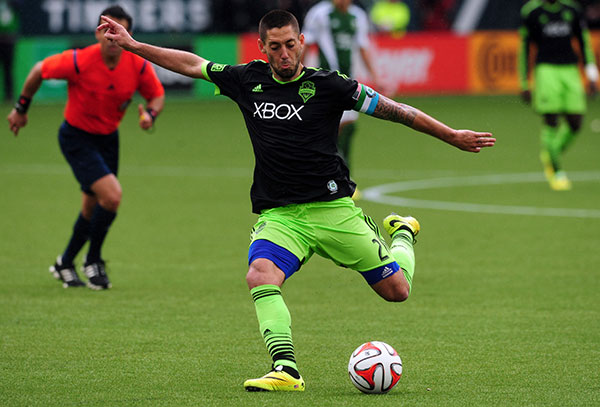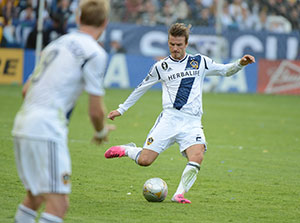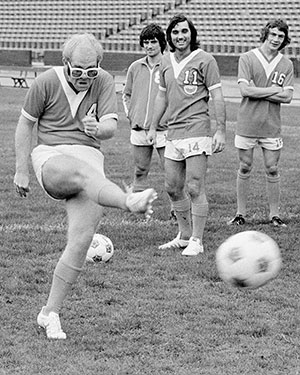How the US learnt to love soccer

Simply sign up to the Life & Arts myFT Digest -- delivered directly to your inbox.
The NBC discussion show Meet the Press has been a staple of US television for decades but anyone tuning in on a recent Sunday was in for a shock. Instead of considered chat from Washington’s halls of power, viewers were treated to live coverage of Manchester City’s Premier League title clincher against West Ham. Leaving aside questions of how wise it was to inflict West Ham’s stupor-inducing football on an unsuspecting public, the broadcast signalled a turning point for football – or soccer, in US parlance.

It may be a mass participation sport for the nation’s children but soccer has never shown any sign of supplanting basketball and American football as the premier US spectator pastime. And yet, on the final day of the Premier League season, NBC, one of four national broadcast networks, devoted 10 channels to live coverage of every game. Close to five million people tuned in and a record 31.5 million watched matches over the season on the NBC Sports channel, according to Nielsen ratings. The willingness of a national network to rip up its schedule suggests that, with the World Cup looming, interest in soccer is rising.
WORLD CUP SPECIAL

Italy
Exclusive interview with top player Andrea Pirlo
Spain
How the reigning champions plan to do it again
Argentina
Can Messi ‘the Messiah’ live up to his name?
England
Why are they so bad
at penalties?
Cameroon
The team with ‘hemle’ and Samuel Eto’o on their side
Brazil
One man, a country’s hopes: superstar Neymar
Bosnia & Herzegovina
Their manager talks strategy for their debut World Cup
Colombia
Can the team affect presidential elections?
My friend Pele
An ‘imperialist Yankee’ reminisces
How to save a penalty
Dutch goalkeeper
Michel Vorm explains
US soccer coverage is often sneered at in Europe, where supporters will wince at comments such as “Manchester beats Liverpool two to zip.” But to dismiss the game in the US out of hand is to do it a disservice. Seattle Sounders recently broke Major League Soccer’s attendance record, averaging more than 44,000 fans per game – more than European giants such as Chelsea, Tottenham, Milan or Juventus. And while David Beckham may have retired from LA Galaxy, he hopes to return to the league as the owner of a new team in Miami.
The MLS has less tribalism than English football but it has deliberately marketed itself to families with razzmatazz: Los Angeles Galaxy games often end with a fireworks display. When I took my son recently, one of the highlights was the interplay between the crowd and the stadium announcer. After a goal, his booming voice echoed around the ground: “And the scorer of that goal, number seven, Robbie…”
“KEANE!” the crowd shouted.
“Robbie…?” the announcer replied.
“KEANE,” they shouted in reply.
“Thank you,” the announcer intoned.
“YOU’RE WELCOME!” the crowd responded.
This happened every time the Galaxy scored. My seven-year-old son still talks about it.
Responsibility for much of the game’s current growth lies with television. For the media companies paying vast sums for rights, soccer has become increasingly valuable. Like other sports, it is best watched live, which means that it can command pricier advertising rates: ad rates have fallen for shows that can be watched at any time, because viewers will often record them and skip through the ads. But ad rates for sports programming have prospered, because brands and advertisers know that viewers will be watching live – commercials and all.
With this in mind, the big US broadcasters are on the lookout for sports programming. Fox, which recently launched a sports channel to compete with ESPN, holds the rights to the Uefa Champions League and is likely to try to regain the Premier League rights when they are next made available. NBC, meanwhile, paid a record $250m for its current Premier League deal, which it used when it relaunched its own sports channel. The network feels its bet paid off. “I’m certain we will face competition [next time] and that’s understandable,” Mark Lazarus, chairman of NBC Sports Group, told the FT recently.

ESPN, the world’s largest and most profitable sports network, has for several years had the rights to the World Cup, but Scott Guglielmino, senior vice-president of programming, says the Euro 2008 tournament was the catalyst for more US interest in the sport.
“I don’t think we’d done ourselves any favours before that,” he says. “We covered the games and we weren’t terribly authentic. But in 2008 we had presenters who were former players. We wanted to draw the casual fan but we had to cater for the avid fan too, and not talk down to them. That worked very well for us.”
The South Africa World Cup, with its raucous, vuvuzela-honking crowds, drew even larger audiences, he says. The network will pull out all the stops for Rio. “We’ll have 300 hours of live, original programming and an hour lead-in [to each game] from the beach in Rio.” The World Cup, he adds, “is a month-long story at a tremendous time of year… We have the ability to make sure fans in the US can have an immersive experience.”
Media companies love the sport because of the mix of people it attracts. “When you look across the demographic, it tends to be younger, more male, more [ethnically] diverse, early tech adopters, expats who might be living here,” explains Guglielmino. “It’s a very attractive audience.”
With so much at stake – and much more money to be made – perhaps this time soccer in the US is here to stay.
Matthew Garrahan is the FT’s global media editor. To comment on this article please post below, or email magazineletters@ft.com
Comments